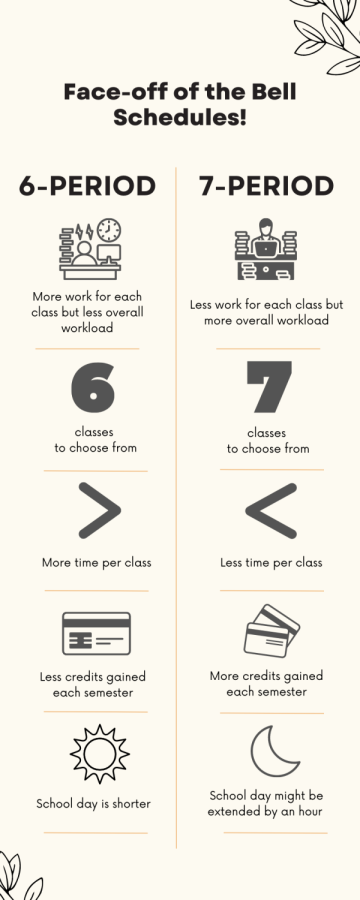Amador Valley should implement a seven-period schedule
Implemented correctly, a seven-period day may prove useful and fun for many students.
September 26, 2022
Students take 48 semester classes in four years at Amador Valley with a six period bell schedule, leaving 90 credits for electives. At first glance, 90 credits seem like a lot – enough to fit in nine elective classes.
However, following the University of California and California State University recommendations, the elective class number drops down to five classes.
If a student decides to take more advanced science courses, that number dwindles even further where students may not be able to explore all of their interests throughout high school.
“I think a seven period that’s not an AP means the workload would be less, and it would be more fun rather than school,” said Emily Li (‘23).
Adding a seventh period can help students explore their interests, but problems such as teacher schedules must be addressed before implementing.
Why aren’t we implementing this?
Adding an extra period may come with its downsides. The plainest of these is the necessity of choosing between either hiring more teachers to teach additional classes, or allocating more than thirty new students to current teachers.
However, due to California’s shortage of qualified teachers, piling more work on top of the current teachers may be what happens.
“As of right now, there is a teacher shortage in California, so we wouldn’t be able to hire a sufficient amount of teachers to maintain a 7-period schedule,” said English teacher Erik Ekstrom.
California has been pushing recently for education reform for long-term solutions for this problem, funding teacher training programs.
A seven-period schedule would also mean either extending the school day or shortening class periods. It could cause many inconveniences.
“[Extending the school day] would put extra stress on the students. They wouldn’t have as much time after-school as they should,” said Ekstrom.
The alternative to extending the school day, which would be to shorten class time, is also a cause for concern.
Shorter lessons can cause challenges for teachers, such as not being able to teach concepts in a timely manner or not having enough time to spark discussion amongst students.
“For subjects like math, students need to learn and understand concepts on a higher level and also develop these skills through repeated practice. I don’t think 40 minutes would be sufficient,” said Ekstrom.
Is there a solution?
Utilizing the optional B period already built into the Amador schedule for just electives can solve these problems. Students can choose to take an optional class to end the day with less stress. However, the school must hire more teachers to accommodate for these extra periods.
“Hiring more teachers would help create these programs,” said Li.
Another solution could be using a system where classes can be allotted time based on the rigor of the course and the class work that is assigned in that class on a daily basis.
“If we are able to come up with a system that provides more demanding subjects with a longer class time while doing the opposite for more thought-based subjects, maybe extending the school day would be unnecessary,” said Ekstrom.
This system allows students to further explore their interests with a seventh period while also having an adequate amount of time to understand the material taught in their other classes.
These seven-period schedules act as a compromise between two extremes, those being either shortening every class period to accommodate for a seventh period or extending the school day for another hour.
“It would be a nice option to have students take more electives that they want while still fulfilling requirements. It’s a nice ideal to have,” said Li.
Overall, it might be tricky at first to completely revamp Amador’s current bell schedule, but ideas such as allotting class time based on subject priority or utilizing the optional B-period as a possible seventh period create a foundation for further reform over the current six-day schedule.















